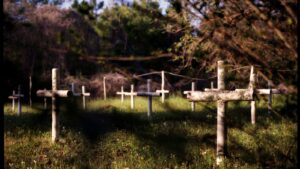
On Monday, Oct. 18, Dozier School abuse survivors met at the Florida Capitol for a press conference seeking financial compensation from the state.
The Florida School for Boys, also known as the Arthur G. Dozier School for Boys, operated as a reform school one hour west of Tallahassee in Marianna.
The school opened as the Florida State Reform School on Jan. 1, 1900. The school was permanently closed in June 2011 after failing a state inspection. The state confirmed multiple instances of abuse following former Florida Gov. Charlie Crist’s order of a full investigation into the school.
The school gained a reputation for physical and sexual abuse, beatings, torture and murder of students by staff. Crist’s state investigation order came because of the “White House Boys” tales.
Up to 300 men sent to the reform school in the 1950s and 1960s are known as the “White House Boys.” In recent years, these men joined together to tell their stories in newspaper accounts and TV reports of the violence they experienced in a small building known as the White House on the school’s grounds.
Jerry Cooper, who was sent to the school in 1961, told NPR he didn’t receive spankings but he was subjected to brutal beatings.
“You didn’t know when it was coming,” Cooper said. “These were not spankings. These were beatings, brutal beatings.”
Cooper said the boys weren’t bad kids but needed help, and the reform school wasn’t the place to find it.
“We weren’t bad kids,” Cooper said. “We might have needed help in some respect. But that wasn’t the place to find it; I’ll tell you that right now.”
Erin Kimmerle, a University of South Florida forensic anthropologist, led the 2012 excavation at Dozier. USF researchers found 55 graves on the Dozier School property known as Boot Hill Cemetery.
According to a 2019 government statement, Kimmerle and other USF researchers were tasked with determining if the “anomalies” found in Boot Hill Cemetery were human burials.
In August 2019, Kimmerle told stakeholders that the researchers’ initial search for more graves came up empty. Kimmerle said the investigation at Dozier is closed unless there is reliable information received to start digging again.
“I feel like we’ve done everything we can in terms of where we can look,” Kimmerle said.
On Oct. 13, Sen. Darryl Rouson introduced Senate Bill 482: Victims of Reform School Abuse. The bill would allow victims of Dozier to file claims and seek compensation.
The bill has been referred to the Senate’s Criminal Justice Appropriations Subcommittee on Transportation, Tourism, and Economic Development.